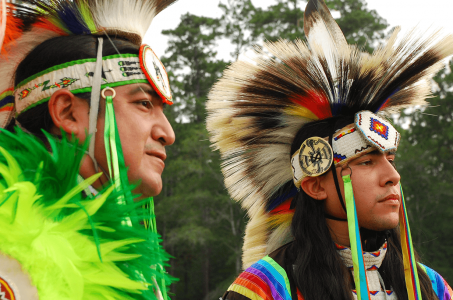US Supreme Court to Hear Texas Tribal Gaming Case, Could Impact Claims in Rhode Island, Maine, Massachusetts
Posted on: October 18, 2021, 04:49h.
Last updated on: November 1, 2021, 01:40h.
The US Supreme Court has agreed to take up a case that could end two tribes’ decades-long fight to exert gaming rights on their sovereign land. A ruling in favor of the tribes will strengthen the claim of any federally recognized Native American group that is restricted from offering gaming by laws that predate the 1988 Indian Gaming Regulatory Act (IGRA).

Legal experts think they have a strong chance of winning.
At the urging of the federal government, the high court on Monday granted the Tigua (Ysleta del Sur Pueblo) tribe’s challenge to a 2019 decision by the 5th Circuit Court of Appeals. That ruling deemed that the bingo-style games they were offering at their modest gaming facility in El Paso were illegal.
The Supreme Court will also examine historical decisions by the district court. Crucially, these include a 1994 ruling that the tribe’s gaming rights are governed by the federal Texas Restoration Act, 1986 (TRA), and not by IGRA.
Raw Deal
TRA recognized the sovereign status of the Tigua, as well as the Alabama Coushatta tribe, based north of Houston, and restored their lands. But it also contained a non-gaming clause.
It was bad timing. Two years later, IGRA enshrined the rights of federally recognized tribes to offer Class II gaming on sovereign land. That’s provided this type of gaming was legal elsewhere in the surrounding state, which is the case in Texas.
The two tribes have long argued they were coerced into signing TRA because they believed it was the only shot they had at regaining sovereign status. They argue that IGRA should supersede TRA.
The tribes have since launched gaming operations on their lands. But the state has pushed back, and the gambling halls have sporadically been forced to close.
Meanwhile, the Kickapoo tribe has offered bingo operations with impunity for 20 years at its much bigger gaming hall close to the Mexican border. It was recognized two years earlier in 1985 by a law that did not include a non-gaming clause.
Tigua Could Win
For the first time in US history, the Department of the Interior is headed by a Native American, Deb Haaland. And the Biden administration has made it clear that it wants the balance redressed in Texas.
Acting US Solicitor General Brian Fletcher wrote to the Supreme Court in August, recommending it take up the case. Fletcher called the 5th Circuit ruling “an error,” and urged the court to deliver clarity on issues that have “impaired the uniformity of a federal regulatory scheme, [and] has uniquely disadvantaged two Indian tribes.”
University of Texas political science professor Todd Curry told El Paso Matters he believes the Tiguas have a strong chance of winning the case. He added that “The real question will be how big is the majority.”
A positive decision in the Supreme Court should strengthen the claims of tribes in other states that find themselves in a similar legal predicament.
That includes the Passamaquoddy, the Penobscot Nation, and the Aroostook Band of Micmac Indians in Maine; the Narragansett Indian Tribe in Rhode Island; and the Wampanoag Tribe of Gay Head in Massachusetts.
“If the Supreme Court takes the case, and if it finds for the tribe, then every other tribe that currently is foreclosed from offering gambling because of a pre-IGRA law would have a basis for arguing that the Court’s new decision supports their getting gambling,” Nova Southeastern University Law professor Bob Jarvis told cgqmltxe.shop last month.
Related News Articles
Most Popular
Genovese Capo Sentenced for Illegal Gambling on Long Island
VEGAS MYTHS RE-BUSTED: The Strip is the Brightest Place on Earth
UPDATE: Former Resorts World & MGM Grand Prez Loses Gaming License
Jackpot News Roundup: Two Major Holiday Wins at California’s Sky River Casino
VEGAS MYTHS RE-BUSTED: The Traveling Welcome to Las Vegas Sign
Most Commented
-
UPDATE: Whiskey Pete’s Casino Near Las Vegas Closes
— December 20, 2024 — 33 Comments -
Zillow: Town Outside Las Vegas Named the Most Popular Retirement City in 2024
— December 26, 2024 — 24 Comments -
Caesars Virginia in Danville Now Accepting Hotel Room Reservations
— November 27, 2024 — 9 Comments -
UPDATE: Former Resorts World & MGM Grand Prez Loses Gaming License
— December 19, 2024 — 8 Comments
















Last Comment ( 1 )
I am waiting for the Indian Tribe from F Troop to get their case before the Supreme Court next. Why Not!!!